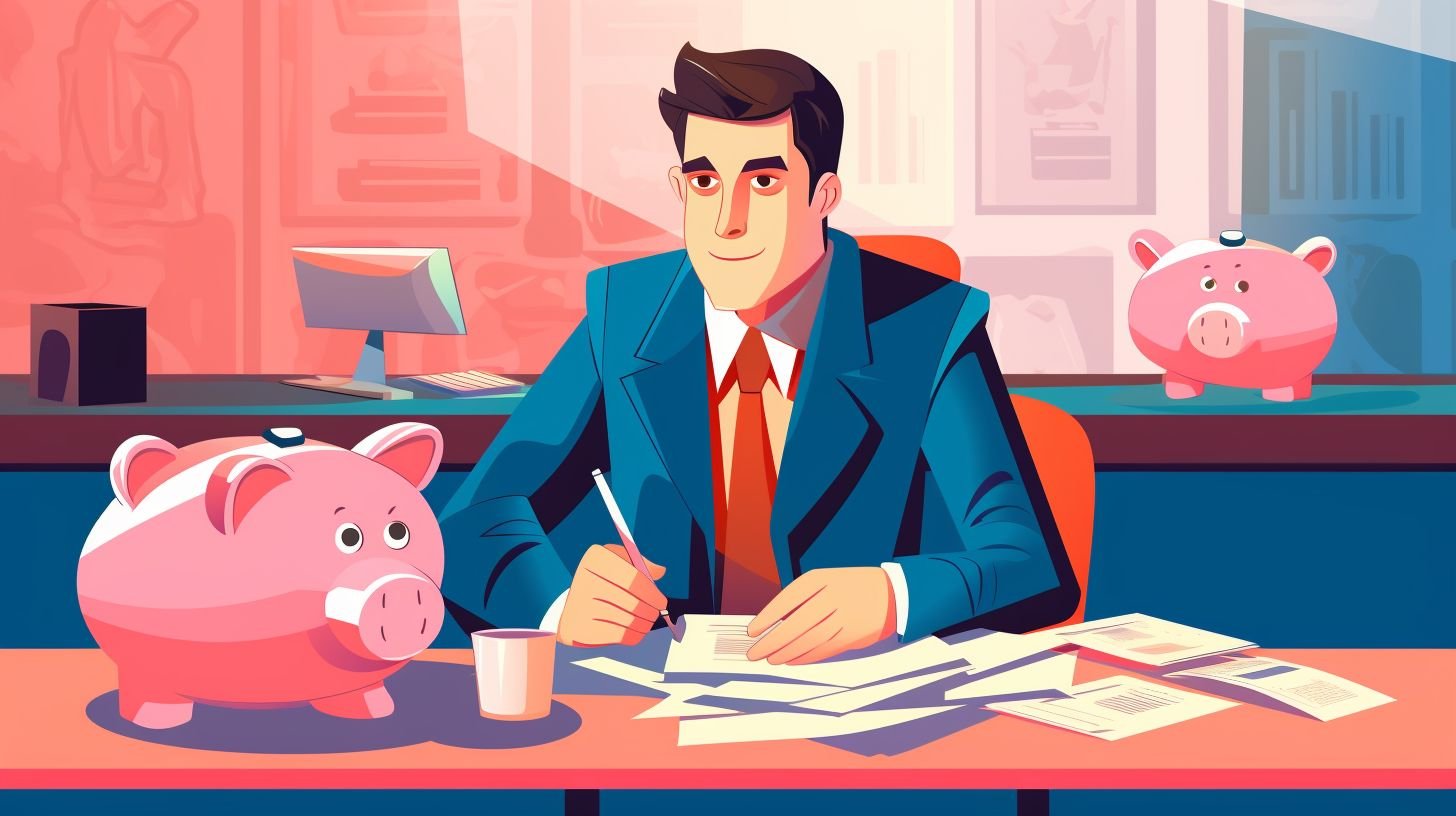Pay Off Debt To Save Money In The Future

Can you relate to the 36 percent of Americans whose credit card debt overshadows their emergency savings? Let me tell you, I completely understand what it feels like to juggle between saving money and peeling off debts.
This blog is all set to provide pragmatic strategies for gradually diminishing your debt while simultaneously cultivating a solid nest egg for future security. Are you ready to seize back control of your finances? Well then, let’s embark on this journey together!
Key Takeaways
- Understanding the different types of debt, such as credit card debt and student loans, is important for making informed decisions about paying it off and saving for the future.
- Debt can have a negative impact on your financial health, including preventing you from saving money and lowering your credit score. Paying off high-interest debt should be a priority to save money in the long run.
- Saving money is essential for achieving financial stability. Aim to save enough to cover at least six months of expenses in case of emergencies.
- Balancing debt repayment and savings depends on factors like interest rates, financial goals, and personal circumstances. Prioritize savings when you have stable income and minimal high-interest debt. Prioritize debt repayment when you have high-interest debts or if they are causing severe stress or mental health issues.
- Two common strategies for debt reduction are the Debt Snowball Method (paying off smallest debts first) and the Debt Avalanche Method (tackling debts with highest interest rates first).
- Having an emergency fund is crucial to protect against unexpected expenses or income loss. Aim to have enough savings to cover three to six months’ worth of living expenses.
- When paying off debt and investing for the future, consider investing while still paying off low – interest debts if opportunities offer higher returns. Paying off all debts before investing can give more freedom in allocating funds towards investments in the future.
Understanding Your Debt

Understanding your debt is crucial for improving your financial health. There are different types of debt, such as credit card debt, student loans, and mortgages, each with its own implications for your financial well-being.
It’s important to grasp the impact that debt can have on your overall financial stability in order to make informed decisions about paying it off and saving for the future.
Types of debt
We all deal with different types of debt. Here are some that most of us face:
- Credit card debt: Many people are dealing with this issue, especially those earning less than $50,000 a year.
- Mortgages: This is another common type of debt. People use it to buy houses.
- Auto loans: Lots of folks have auto loans to pay for their cars.
- Student loans: Many students have to borrow money to go to school.
The impact of debt on financial health
Debt can hurt your money health a lot. It can stop you from saving money for the future. High-interest debt like credit card debt is very bad. You must use your money to pay it off fast.
If not, you will always owe more and more money. This happens because of compounding interest charges. Also, having too much debt can lower your credit score. Then, getting new loans or credit cards becomes hard for you.
A low credit score means higher interest rates on borrowed money as well! Having a lot of overdue debts can stress you out too, which is not good for your mind health.
The Importance of Saving

Saving money is essential for achieving financial stability and security. It provides a safety net for unexpected expenses, helps to achieve long-term goals, and reduces reliance on credit.
By prioritizing savings, individuals can build a solid financial foundation and create opportunities for future investment and growth.
The role of savings in financial stability
Savings play a big part in keeping your money safe. If you save, you have money to use when things go wrong. For example, if your car breaks down or if you lose your job. More than this, savings can help stop more debt from piling up.
A large part of us, around 43 percent, cannot pay an unexpected $1,000 bill with our savings alone. This shows how important it is to have savings for such times. Without savings, we might need to borrow even more money and get deeper into debt.
How much should you save?
You should aim to save enough money to cover your expenses for at least six months. This goal gives you a safety net if unexpected costs come up. It helps you avoid taking on more debt.
57 percent of people believe this is the right amount to have saved away. But keep in mind, saving money can be tough when paying off debts! So, start small and build up over time.
Don’t worry if you’re not there yet. Every cent saved brings you closer to financial security and peace from debt stress.
Balancing Debt Repayment and Savings
When it comes to balancing debt repayment and savings, it is important to consider your individual financial situation and goals.
When to prioritize savings
I believe it’s important to prioritize savings when you have a stable income and minimal high-interest debt. By focusing on saving money, you can build up an emergency fund to protect yourself from unexpected expenses or financial hardships.
It’s also wise to prioritize savings if you don’t have any immediate financial goals that require paying off debt quickly. Remember, having savings provides a safety net and gives you more financial security in the long run.
When to prioritize debt repayment
Knowing when to prioritize debt repayment is crucial for achieving financial stability. One important factor to consider is the interest rate on your debts. If you have high-interest debts, such as credit cards or personal loans with rates above 10%, it’s generally wise to prioritize paying off those debts first.
By doing so, you can save a significant amount of money in interest charges over time.
Another consideration is your financial goals and priorities. If you have a specific savings goal, such as buying a house or starting a business, it may be beneficial to allocate more funds towards saving instead of aggressively paying down debt.
However, it’s essential to strike a balance between debt repayment and saving — don’t neglect one at the expense of the other.
Additionally, if your debts are causing severe financial stress or negatively impacting your mental health, prioritizing debt repayment might be necessary for peace of mind and emotional well-being.
Strategies for Debt Reduction

There are two common strategies for debt reduction: the Debt Snowball Method and the Debt Avalanche Method.
The Debt Snowball Method
The Debt Snowball Method is a strategy for paying off debt. It involves starting with your smallest debt and focusing on paying it off first, while still making minimum payments on your other debts.
Once that smallest debt is paid off, you take the money you were putting towards it and apply it to the next smallest debt. This method helps create momentum as you see those smaller debts getting paid off quickly.
It can give you a sense of progress and motivation to continue tackling your larger debts. By using the Debt Snowball Method, you can pay off your debts faster and gain control over your financial situation.
The Debt Avalanche Method
The Debt Avalanche Method is a strategy for paying off debt and saving money in the future. It focuses on tackling debts with the highest interest rates first. By prioritizing these high-interest debts, you can save more money over time by minimizing the amount of interest you have to pay.
This method helps individuals take control of their finances and work towards becoming debt-free faster. It is especially beneficial for those who are looking to save as much money as possible while paying off their debts efficiently.
The Role of an Emergency Fund
An emergency fund is a crucial financial safety net that provides protection against unexpected expenses or income loss. It acts as a buffer to cover essential living expenses during challenging times and prevents individuals from going further into debt.
How much emergency fund should you have?
It’s important to have an emergency fund in case unexpected expenses come up. Many financial experts recommend having enough savings to cover three to six months of living expenses.
This can give you a safety net and peace of mind if you face a job loss, medical expenses, or other emergencies. A recent survey found that 57 percent of people believe they would need enough emergency savings to cover six months or more of expenses in order to feel comfortable.
Having this cushion can help reduce stress and provide financial security when the unexpected happens.
When should you use your emergency fund?
I use my emergency fund when unexpected expenses come up. It’s important to have a safety net for those times when life throws us a curveball. For example, if my car breaks down or I have a medical emergency, I can dip into my emergency fund to cover the costs without having to rely on credit cards or loans.
Many financial experts recommend having at least three to six months’ worth of living expenses saved in your emergency fund. This can give you peace of mind and help you avoid going into debt during challenging times.
Paying Off Debt to Invest for the Future

When it comes to paying off debt and investing for the future, there are two scenarios to consider: investing while still paying off debt or prioritizing debt repayment before investing.
Scenario 1: Invest while still paying off debt
When it comes to managing debt and saving for the future, Scenario 1 involves investing while still paying off debt. This scenario is suitable when you have low-interest debts and a good opportunity to invest in assets that can generate higher returns.
By opting for this approach, you prioritize both debt repayment and wealth accumulation.
Investing while paying off debt can be beneficial because it allows you to take advantage of compound interest over time. You can start by contributing to retirement accounts like a 401(k) or individual retirement account (IRA) that offer tax advantages and potential employer matching contributions.
Additionally, you can explore other investment opportunities such as stocks, mutual funds, or real estate.
However, before considering this strategy, it’s essential to evaluate your financial situation carefully. Consider factors such as the interest rates on your debts compared to potential investment returns.
It’s crucial to have a solid plan in place and ensure that your investments are generating enough income to outweigh any interest charges from your debts.
Scenario 2: Pay off debt before investing
Paying off debt before investing is a smart move. It allows you to have more money available for investments in the future. Debt can hold you back from reaching your financial goals, so getting rid of it first gives you more freedom.
By prioritizing debt repayment, you can potentially earn almost a million dollars more compared to investing while still having debt. It’s important to use strategies like the debt snowball or avalanche method to pay off debts faster and become debt-free.
Once that’s done, focus on building an emergency fund with 3 to 6 months’ worth of essential living expenses. Investing 15% of your gross household income is recommended for long-term wealth building.
Can Saving Money on Electronics Deals Help Me Pay Off Debt Faster?
Saving money on electronics deals can definitely help you pay off debt faster. By knowing how to save money on electronics, you can make smarter purchasing decisions and allocate more funds towards debt repayment. Look for discounts, compare prices, and consider buying refurbished or second-hand products. These savings can make a significant difference in your debt payoff journey.
Conclusion
Paying off debt is crucial for saving money in the future. By understanding our debts, balancing repayment and savings, and using strategies to reduce debt, we can build a stronger financial foundation.
Prioritizing emergency funds and investing after debt repayment also sets us up for long-term financial security. Start taking steps today to pay off your debts and create a better future for yourself financially.






